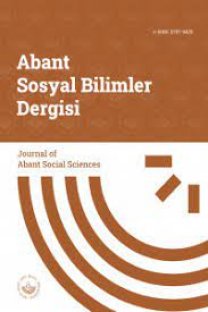Üst Orta Gelirli Ülkelerde Makroekonomik Performans Göstergelerinin Yoksulluk Üzerine Etkisi
yoksulluk, makroekonomik göstergeler, sistem GMM dinamik panel veri analizi
The Effect of Macroeconomic Performance Indicators on Poverty in Upper Middle Income Countries
___
- Abay, M. Ç. ve Sezgin, S. (2018), Türkiye ve Bazı AB Ülkelerinde Yoksulluk ve Gelir Dağılımı, Journal of Life Economics, 5(4), s.97-110.
- Adeyemi, S. L. ve Ijaiya, G. T. (2009), Determinants of Poverty in Sub-Saharan Africa, African Research Review, 3(2), s.162-177.
- Ajibola A., Loto, M. A. ve Enilolobo, O. (2018), Poverty and Inequality in Nigeria: Implications for Inclusive Growth, Nile Journal of Business and Economics, 9, s.30-51.
- Amjad, R. ve Kemal, A. R. (1997), Macroeconomic Policies and Their Impact on Poverty Alleviation in Pakistan, The Pakistan Development Review, 36(1), s.39-68.
- Arellano, M. ve Bond, S. (1991), Some Tests of Specification for Panel Data: Monte Carlo Evidence and An Application to Employment Equations, The Review of Economic Studies, 58(2), s.277-297.
- Arellano, M. ve Bover, O. (1995), Another Look at The Instrumental Variable Estimation of Error-Components Models, Journal of Econometrics, 68(1), s.29-51.
- Arellano, M. (2003), Panel Data Econometrics, England: Oxford University Press.
- Blundell, R. ve Bond, S. (1998), Initial Conditions and Moment Restrictions in Dynamic Panel Data Models, Journal of Econometrics, 87, s.115-143.
- Cafri, R. (2009), Adana İlinde Yoksulluğun Analizi: Sınırlı Bağımlı Değişkenli Modellerle Bir İnceleme, Yayımlanmamış Yüksek Lisans Tezi, Çukurova Üniversitesi Sosyal Bilimler Enstitüsü, Adana.
- Chang Tsai, M. (2006), Economic and Non-Economic Determinants of Poverty in Developing Countries: Competing Theories and Empirical Evidence, Canadian Journal of Development Studies, 27(3), s.267-285.
- Cheema, A. R. ve Sial, M. H. (2012), Poverty, Income Inequality, and Growth in Pakistan: A Pooled Regression Analysis, The Lahore Journal of Economics, 17(2), s.137-157.
- Datt, G. ve Jolliffe, D. (1999), Determinants of Poverty in Egypt 1997, FCND Discussion Paper, 75, s.1-52.
- Evcim, N., Güneş, S. ve Karaalp Orhan H. S. (2019), Yoksulluk ve Ekonomik Göstergeler Arasındaki İlişki: MENA Bölgesi Analizi, Pamukkale Üniversitesi Sosyal Bilimler Enstitüsü Dergisi, 36, s.291-310.
- Fosu, A. K. (2010), Inequality, Income, and Poverty: Comparative Global Evidence, BWPI Working Paper, 91(5), s.1-20.
- http://dep.manas.edu.kg/img/files/ , (Erişim Tarihi: 03.08.2020).
- Jamal, H. (2006), Does Inequality Matter for Poverty Reduction? Evidence from Pakistan’s Poverty Trends, The Pakistan Development Review, 45(3), s.439-459.
- Kanca, O. C. ve Akan Y. (2019), Kalkınma Sürecinde Yoksulluk, Gelir Dağılımı ve Sosyal Yardımlar, (Ed.:, S. A. Oktar ve Y. Taşkın), Maliye Araştırmaları-3 içinde, s.246-258, İstanbul: On İki Levha Yayıncılık.
- Mulok, D., Kogid, M., Asid, R. ve Lily, J. (2012), Is Economic Growth Suficient for Poverty Alleviation? Empirical Evidence from Malaysia, Cuadernos De Economía, 35, s.26-32.
- Ogbeide, E. N. O. ve Agu, D. O. (2015), Poverty and Income Inequality in Nigeria: Any Causality?, Asian Economic and Financial Review, 5(3), s.439-452.
- Osinubi, T. S. (2005), Macroeconometric Analysis of Growth, Unemployment and Poverty in Nigeria, Pakistan Economic and Social Review, 43(2), s.249-269.
- Özcan, S. E. (2016), Yoksulluk Göstergesi Olarak Hoşnutsuzluk Endeksi, Türkiye İçin Bir Deneme, Sosyal Bilimler Dergisi, 48, s.294-312.
- Rupasingha, A. ve Goetz, S. J. (2007), Social and Political Forces as Determinants of Poverty: A Spatial Analysis, The Journal of Socio-Economics, 36, s.650-671.
- Shalini, R. T. ve Boopen, S. (2011), On the Link Between Urban Infrastructure and Poverty: Evidence from Africa Using GMM Estimates, Policy & Politics, 39(1), s.221-38.
- SWIID, (The Standardized World Income Inequality Database), https://fsolt.org/swiid/, (Erişim Tarihi: 09.08.2020).
- Tatoğlu, Yerdelen, F. (2018), İleri Panel Veri Analizi Stata Uygulamalı, İstanbul: Beta Yayımcılık.
- Thorbecke, E. (2013), The Interrelationship Linking Growth, Inequality and Poverty in Sub-Saharan Africa, Journal of African Economies, 22(1), s.15-48.
- Usio Uchechi, T. ve Ibrahim V. H. (2020), Income Inequality and Poverty in Nigeria: An Empirical Analysis, IOSR Journal of Economics and Finance (IOSR-JEF), 11(3), s.7-14.
- World Bank, https://www.worldbank.org/ , (Erişim Tarihi: 09.08.2020).
- Zaman, K., Rashid, K., Khan, M. M. ve Ahmad, M. (2011), Panel Data Analysis of Growth, Inequality and Poverty: Evidence from SAARC Countries, Journal of Yasar University, 21(6), s.3523-3537.
- Yayın Aralığı: 3
- Başlangıç: 2000
- Yayıncı: Abant İzzet Baysal Üniversitesi Sosyal Bilimler Enstitüsü
Enerji Korkusunun Temiz Enerji ETF Volatilitesi Üzerine Etkisi: TVP-VAR Uygulaması
Arife ÖZDEMİR HÖL, Nazlıgül GÜLCAN, Namıka BOYACIOĞLU
Karşıt Kamusal Alan Olarak Gecekondu ve Toplumsal Hareketlere Türk Sinemasından Bakmak
Havayolu Endüstrisinde Pazar Yapısı ve Rekabet: Gelişmekte Olan ve Gelişmiş Ekonomilerden Kanıtlar
Mehmet YAŞAR, Selçuk KAYHAN, Kasım KİRACI
Okyanus Kirliliğine Karşı Yeni Bir Finansal Yöntem: Mavi Tahviller
Türkiye’de Genç Kadın İşsizliğinde Histeri Etkisi: Fourier ADF Testinden Kanıtlar
Modern Türk Tiyatrosunda Divan Edebiyatı İzlerine Bir Örnek: Mahiyet-i Aşk
Gül Nihal KUL, Bilge KAYA YİĞİT
Türkiye’de Çocuk Gelişimi Bölümü Erkek Lisans Öğrencisi Olmak: “Erkek Adam Çocuk Gelişimi mi Okur?”
Erhan ALABAY, Rana ALAN, Betül AÇIKALIN, Demet ERDENCİ, Fatıma DARCAN, İrem DURSUN, Fatma Nur ZUNLUOĞLU
